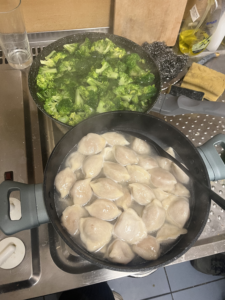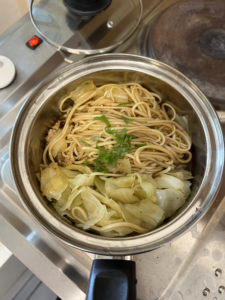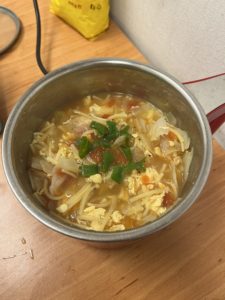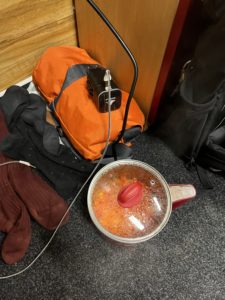Food. One of the biggest struggles of living in Prague long term was the food. It’s important to have a place where you can cook properly and use regularly. A lot of restaurant food and kebabs were too salty for my taste, especially at the start. Eventually, my taste buds got used to the high salt content that kebabs were not salty anymore a few months in. Most of the portions are very big so if you don’t eat a lot, you either keep wasting food or slowly stretch your stomach.


I tried cooking in my dorm but there are only two burners in each apartment and it took an hour for me to even boil a small pot of water so it was quite frustrating to cook at times. The common area with the stove is very small and shared among 6 people. I sometimes had to wait until quite late at night before I can cook dinner. Having a small cooker (rice cooker or those portable electric cookers) is very convenient as it cooks faster and you can use it anytime you want.


Chinese food, while slightly more expensive, is convenient and has more options. Sapa, Little Hanoi, has good Vietnamese food and a friendly, family-like culture. However, it is quite inconvenient to travel to.
The thing I appreciated the most about living in Prague is that it is a very safe place to live in. I could walk the streets alone at night and feel safe. People are generally very nice, aside from occasional racist comments. Getting around Prague is also easy, you can walk or take public transport with the cheap monthly student transpose pass. However, it gets very cold during the end of the year so it is important to bring warmer, waterproof coats. Buying coats there is also possible as clothing can get pretty cheap at outlet stores during clearance sales.
One thing I did not expect to have such a huge impact was the language barrier. Quite a significant number of Czechs either do not or speak very little English.
Simply walking around Prague, on the streets, on public transport and in shops, it is not very common to hear English being spoken in normal conversations. Many of the shop owners and workers do not speak or understand English, so sometimes it can be quite hard to ask them for anything or if they try to tell or ask you something about your order.
It really hit me within the first month, when one of the Czech students in my studio was trying to tell us that she created a microsoft teams group and wanted to get our emails to add us in. At the end of our conversation, she apologised and said that she was not good at English and felt so stupid.
At that moment, I felt so helpless and sad that she would feel that way. What she said really made me think because I thought her English was not that bad but interestingly enough, for the rest of the term, she did not speak English at all. For presentations, she would not even attempt to speak English, using Czech straightaway. As our professor was quite international and has been around the world, his command of English was not bad, thus he would often try to encourage the Czech students to present in English.
However, I came to an even deeper understanding of how she felt, after I tried putting myself in her shoes and really think about how presenting in Mandarin would be like, especially having to use technical terms.





























